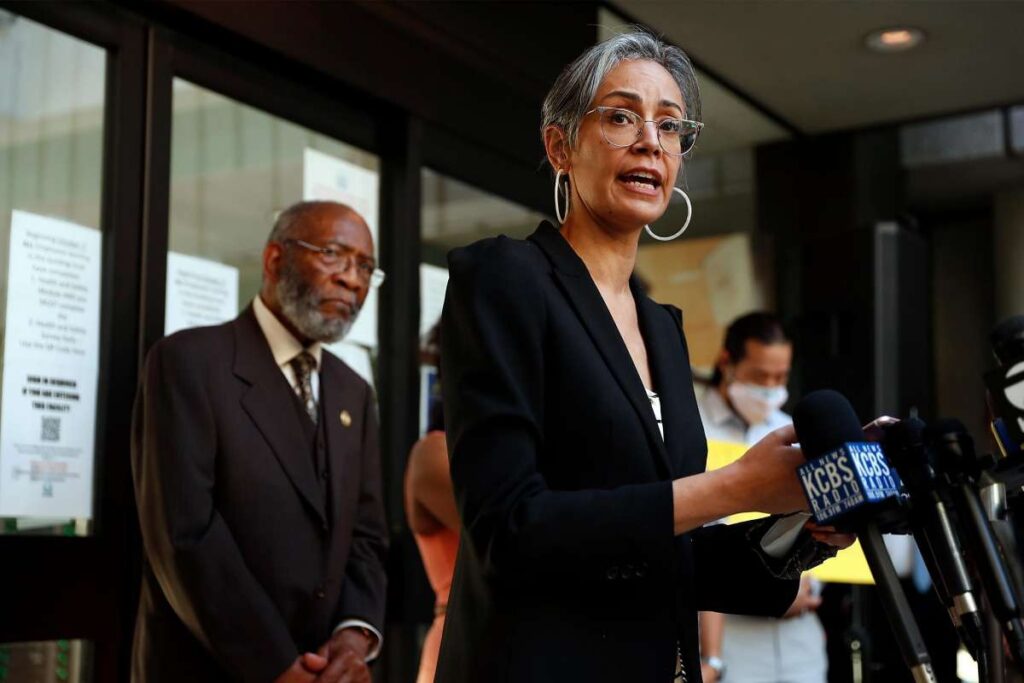Alison Collins and her husband illegally merged two S.F. apartments, city says

Embattled San Francisco school board member Alison Collins and her husband, veteran real estate developer Chris Collins, violated city real estate laws when they merged two Russian Hill apartments to create a larger home, city officials ruled Wednesday.
The Collinses connected separate upper- and lower-level apartments without receiving proper city approval, according to a Planning Department letter sent on Wednesday and reviewed by The Chronicle.
The investigation was spurred by a 103-page anonymous complaint on April 4 that alleged the illegal merger and construction beyond the scope of permits, which the Department of Building Inspection is investigating separately. The complaint alleges that the city lost a housing unit, permit fees and property tax revenue.
A city planner who visited the property last week found a new sliding door that connects the two units and that the upper unit’s full kitchen was replaced with a bathroom, according to the letter. “Work appears to have exceeded the scope of approved plans,” according to the letter.
They must now seek retroactive approval or restore the two separate units by blocking entryways between the apartments and restoring full kitchens in each unit.
Collins and her husband must respond to the letter and begin fixing the violations within 15 days or they face minimum fines of $1,504 plus up to $250 per day that the violation continues. Collins can appeal the violations to the zoning administrator, followed by the Board of Appeals.
Collins and her husband didn’t respond to requests for comment by text, voicemail and email over the past week. The Chronicle is not publishing the address because of the risk of potential harassment.
The Collins family bought the two-unit apartment building in 2003 for $780,000, completed extensive renovations, and unsuccessfully listed it for sale as a single three-level home for $3.25 million in 2019, according to real estate records. It is no longer on the market.
The city requires property owners to obtain a conditional use authorization — a lengthy process that can take years — before removing a housing unit through a merger. The Planning Department confirmed that Collins and her husband never applied to merge the units at the property.
The anonymous person behind the complaint said he or she became aware of the alleged violations in March after seeing a 2019 sales listing for the building.
The motivations behind the building complaint are unclear. The filing came two weeks after Collins’ 2016 racist tweets drew widespread criticism, making her a lightning rod on a school board that had already been slammed for its lack of reopening plan, removing merit-based admission to Lowell High, and a now-suspended effort to rename 44 schools that the board said honored people with links to racism and oppression. The school board later voted to remove her from committees and stripped her of the vice presidency for the remarks.
She responded with an $87 million lawsuit, alleging that the board and district violated her free speech rights and caused financial and emotional harm. Elected officials condemned the lawsuit, with Mayor London Breed calling it “embarrassing” and “disgraceful.”
A group of parents and school alumni, which uncovered the 2016 tweets, is organizing a potential recall against Collins and two other school board members.
Siva Raj, an organizer of the recall campaign, said the recall campaign had no connection to the complaint and had no knowledge of who filed it.
“We would expect any elected official to follow the law,” he said, declining to comment further.
Multiple veteran land use attorneys told The Chronicle the scale and detail of the complaint were highly unusual.
Joseph Tobener, a San Francisco attorney who represents tenants and isn’t involved in the complaint, said he had never seen one so long or detailed in two decades working in real estate law.
“Typically you would just complain with a call or filling out an online form,” Tobener said. “It would be one line.”
“It’s really unusual to see someone go to town on an owner” by filing such lengthy allegations, he said.
Two other land use attorneys who didn’t want to be identified because of the controversy surrounding Collins agreed that the complaint was far longer and more thorough than any other filing they have seen. They were granted anonymity to provide legal insight. The document was likely prepared by an experienced real estate professional, they said. For instance, the complaint includes sales data from the Multiple Listing Service, a real estate database available only to licensed brokers.
The Department of Building Inspection has received complaints that are a similar length, but the majority are “substantially” shorter, said Patrick Hannan, a department spokesman.
Anonymous complaints and allegations of unit merging are common, he said.
The Department of Building Inspection’s separate building permit investigation was opened on April 5, and the department unsuccessfully attempted to inspect the building by ringing the doorbell on April 12, city records show. The department mailed a letter requesting access the next day. On April 19, the department received a voicemail acknowledging the letter and is scheduled to inspect the property on Friday at noon. The department investigates all such complaints and requires an in-person inspection to close a case, said Hannan.
SOURCE:
sfchronicle https://www.sfchronicle.com/local/article/Alison-Collins-and-her-husband-illegally-merged-16121805.php
